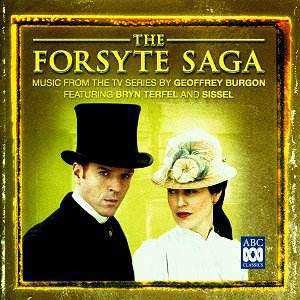Geoffrey BURGON
The Forsyte Saga Music from the Television Series
Bryn Terfel, (baritone) Sissel (soprano) Ian Brown (piano)Unidentified Orchestra led by Janice Graham. Conducted by Geoffrey Burgon
ABC CLASSICS 472 275-2 [56.55]
Crotchet Amazon UK

Burgon has an extensive track record as a composer of television music – in 1979 Testament of Youth was followed by Tinker, Tailor, Soldier, Spy, of which the Nunc dimittis took on an independent life of its own. Two years later saw Brideshead Revisited and, if anything, even greater success and he has continued to produce scores for television, though considerably less so for film – his last major score before The Forsyte Saga was for Longitude, an award winner in 2001.
Twenty-five separate tracks – none broaches five minutes, many hover around the minute mark and a couple boast small contributions from Bryn Terfel and Scandinavian pop singer Sissel. Burgon is unfailingly evocative as he summons up ghostly reminiscences and hints. He is also capable of introducing sonorities and stylistic techniques to convey mood and interior meaning. The waltz stalks the opening track and introducing the character Dartie is by means of a perky and well rounded, burnished cornet. Burgon introduces the merest hints of minimalism in the track called Irene meets the family whereas in Irene in love the romantic piano interludes - here and elsewhere played by Ian Brown – allude to Schumann. Burgon turns on the rusticity in Robin Hood and in The death of Bosinney he conveys the scene by repeated piano "heart beats" suddenly ending. Love-lorn characters are accompanied by a heavy treading bass section lightened by reminiscent lulling woodwind. Burgon can mine his rather French influences in, for example, the wistful Where is Irene or else can, once more, sail close to the Minimalist wind, as in the oscillating and repetitive June's Song. Much of the writing is couched in the romantic vernacular and embraces subtle evocation of a Parisian salon, or musical pastiche or lightly spectral brooding.
The soloists make their mark – Ian Brown is a sensitive exponent, Terfel and Sissel do their very limited bit – about three minutes apiece – and Burgon conducts the session band, led by Janice Graham, with romantic aplomb.
Jonathan Woolf

Return to Index